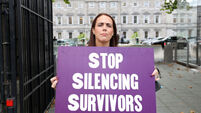Elaine Loughlin: Long history of empty promises in response to violence against women

Elaine Loughlin On the Plinth
Tomorrow, TDs will stand up in the Dáil to add to the millions of words that have been uttered and written since the horrific killing of Ashling Murphy.
While words have helped us all to express the overwhelming feelings of sorrow, fear, anger and hopelessness in the wake of the murder, they are no longer enough.















